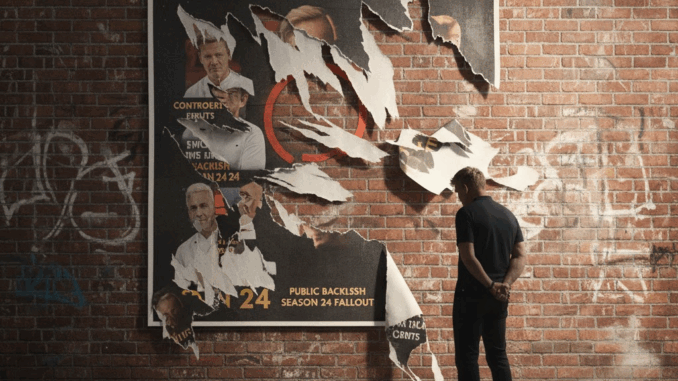
For nearly two decades, Hell’s Kitchen has reigned as one of television’s most thrilling, chaotic, and addictive reality shows. But this time, the fire might finally be too hot — even for Gordon Ramsay. The show’s 24th season, which was meant to mark a triumphant return to high-stakes cooking and signature drama, has instead ignited a massive controversy that’s spreading faster than grease on a flame. Viewers are fuming, critics are piling on, and social media is ablaze with one word: boycott.
It all started after the season premiere aired last Friday on FOX. Within hours, the internet erupted with outrage over what many fans are calling “the most toxic season yet.” The episode featured a string of humiliating eliminations, verbal breakdowns, and one shocking on-air confrontation that some viewers described as “borderline bullying.” One clip, which quickly went viral on TikTok, shows Ramsay shouting so loudly at a contestant that their microphone cuts out — followed by the contestant storming off in tears.
“That wasn’t tough love,” wrote one viewer on Reddit. “That was just cruelty for ratings.” Another post, now with over 40,000 upvotes, read bluntly: “Hell’s Kitchen is officially unwatchable. It’s no longer about cooking — it’s about public humiliation.”
Critics didn’t hold back either. The Guardian called the new season “a desperate attempt to keep the show relevant by doubling down on aggression,” while one American entertainment blogger declared it “the end of an era — Ramsay’s brand of rage no longer feels entertaining, it feels exhausting.”
The backlash has also led to a growing online movement urging fans to boycott the series altogether. Hashtags like #CancelHellsKitchen and #StopTheScreaming have trended multiple times on X (formerly Twitter), with viewers calling out what they see as an outdated and harmful depiction of kitchen culture. “We’ve evolved past this kind of reality TV,” one fan wrote. “We want to see mentorship, not meltdowns.”
But Ramsay’s defenders argue that the criticism misses the point. “This is Hell’s Kitchen, not Tea Party with Gordon,” one fan commented. “It’s supposed to be intense. That’s the beauty of it — it’s pressure, perfection, and passion.” Even so, the numbers tell a different story. According to early reports, the second episode of the season saw a 15% drop in live viewership, marking one of the steepest declines in the show’s history.
To make matters worse, behind-the-scenes reports are painting an even darker picture. Several crew members have allegedly spoken to entertainment outlets claiming production was “hellish” this year — with longer shooting hours, scripted confrontation setups, and pressure from executives to “push the drama to the limit.” One anonymous source even claimed that some contestants were “encouraged” to provoke Ramsay to fuel viral moments.

“Everything felt exaggerated this season,” the insider said. “Gordon was angrier, the contestants were more chaotic, and the producers wanted every second to trend online. It’s not the same show anymore.”
When approached for comment, FOX issued a brief statement defending the show’s creative direction: “Hell’s Kitchen continues to showcase the reality of high-pressure cooking environments and the journey of chefs striving for excellence under the guidance of one of the world’s most accomplished culinary leaders.”
Ramsay himself has stayed silent — a rare move for the famously outspoken chef. But sources close to him suggest he’s “deeply aware” of the backlash and “not happy” with how the show has been perceived this season. Some insiders believe he’s planning to address the controversy directly in an upcoming interview or on his personal social channels.
Whether the outrage will fade or mark a turning point for Hell’s Kitchen remains to be seen. The show’s legacy is monumental — but its formula may finally be showing its cracks. As one long-time viewer put it, “We loved the fire when it felt real. Now it just feels cruel.”
Still, if there’s one thing Ramsay knows better than anyone, it’s how to turn disaster into reinvention. He’s done it before — and if history is any guide, he may yet find a way to flip this controversy into another unforgettable chapter of his TV empire.
Until then, one question hangs in the air like the smoke of a burnt risotto: Has Gordon Ramsay finally gone too far — or is Hell’s Kitchen just too real for its own good?